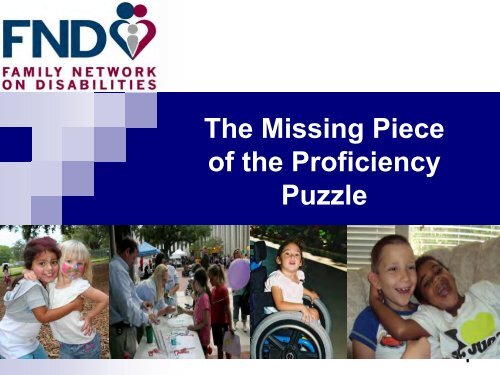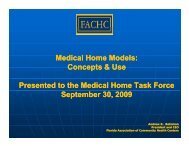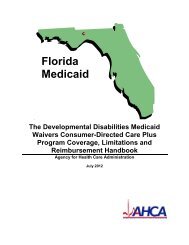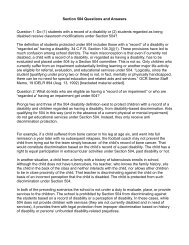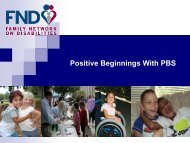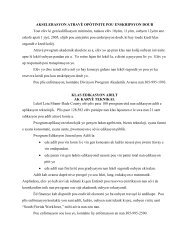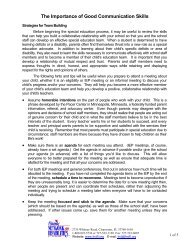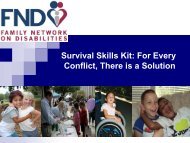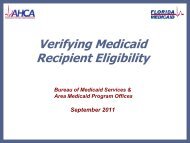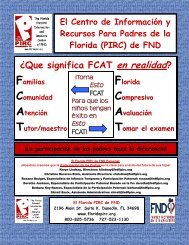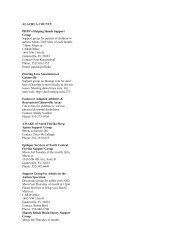The Missing Piece of the Proficiency Puzzle - The Family Network on ...
The Missing Piece of the Proficiency Puzzle - The Family Network on ...
The Missing Piece of the Proficiency Puzzle - The Family Network on ...
- No tags were found...
You also want an ePaper? Increase the reach of your titles
YUMPU automatically turns print PDFs into web optimized ePapers that Google loves.
<str<strong>on</strong>g>The</str<strong>on</strong>g> <str<strong>on</strong>g>Missing</str<strong>on</strong>g> <str<strong>on</strong>g>Piece</str<strong>on</strong>g><str<strong>on</strong>g>of</str<strong>on</strong>g> <str<strong>on</strong>g>the</str<strong>on</strong>g> Pr<str<strong>on</strong>g>of</str<strong>on</strong>g>iciency<str<strong>on</strong>g>Puzzle</str<strong>on</strong>g>1
Commissi<strong>on</strong>er’sParent Advisory CouncilWhat is <str<strong>on</strong>g>the</str<strong>on</strong>g> CPAC?Who are <str<strong>on</strong>g>the</str<strong>on</strong>g> members?What is its missi<strong>on</strong>?2
When does parent involvementin schools lead to improvedstudent achievement?When thoughtful applicati<strong>on</strong> isgiven to how families areinvolved at <str<strong>on</strong>g>the</str<strong>on</strong>g> school level.3
Most ParentInvolvement in Schools...has a focus <strong>on</strong> schools!Improved facilitiesImproved school climateImproved instructi<strong>on</strong>al materialsImproved working c<strong>on</strong>diti<strong>on</strong>s forstaff4
But What AboutStudent Achievement?Research shows studentsare more likely to beacademically successful when<str<strong>on</strong>g>the</str<strong>on</strong>g>y have adults in <str<strong>on</strong>g>the</str<strong>on</strong>g>ir liveswho advocate for <str<strong>on</strong>g>the</str<strong>on</strong>g>m.5
<str<strong>on</strong>g>The</str<strong>on</strong>g> <str<strong>on</strong>g>Missing</str<strong>on</strong>g> <str<strong>on</strong>g>Piece</str<strong>on</strong>g> <str<strong>on</strong>g>of</str<strong>on</strong>g> <str<strong>on</strong>g>the</str<strong>on</strong>g>Pr<str<strong>on</strong>g>of</str<strong>on</strong>g>iciency <str<strong>on</strong>g>Puzzle</str<strong>on</strong>g>Recommendati<strong>on</strong>s for InvolvingFamilies and Community inImproving Student AchievementCPAC Final Report to <str<strong>on</strong>g>the</str<strong>on</strong>g>Kentucky Department <str<strong>on</strong>g>of</str<strong>on</strong>g> Educati<strong>on</strong>June, 2007http://www.prichardcommittee.org/parents/cipl/6
<str<strong>on</strong>g>The</str<strong>on</strong>g> <str<strong>on</strong>g>Missing</str<strong>on</strong>g> <str<strong>on</strong>g>Piece</str<strong>on</strong>g> ReportDefines family andcommunity involvementspecifically forimproving student achievement.7
<str<strong>on</strong>g>The</str<strong>on</strong>g> <str<strong>on</strong>g>Missing</str<strong>on</strong>g> <str<strong>on</strong>g>Piece</str<strong>on</strong>g> ReportSets standards and levels <str<strong>on</strong>g>of</str<strong>on</strong>g>performance at <str<strong>on</strong>g>the</str<strong>on</strong>g> school level:• Supporter: endorsing <str<strong>on</strong>g>the</str<strong>on</strong>g> school’s processand people.• Advocate: speaking up for <str<strong>on</strong>g>the</str<strong>on</strong>g> student’sneeds.• Teacher: instructing <str<strong>on</strong>g>the</str<strong>on</strong>g> child.• Decisi<strong>on</strong>-maker: shaping policies,procedures, and learning envir<strong>on</strong>ment.8
Recommendati<strong>on</strong>s• Set high expectati<strong>on</strong>s, measureperformance, and report progress.• Help schools improve relati<strong>on</strong>ship-buildingand communicati<strong>on</strong>s by establishingadvisory councils at all levels.• Provide state level support and resourcesfor districts, schools, families, andcommunity.• Build capacity through pr<str<strong>on</strong>g>of</str<strong>on</strong>g>essi<strong>on</strong>aldevelopment for every<strong>on</strong>e. 9
<str<strong>on</strong>g>The</str<strong>on</strong>g> <str<strong>on</strong>g>Missing</str<strong>on</strong>g> <str<strong>on</strong>g>Piece</str<strong>on</strong>g> -Six Key Objectives1. Relati<strong>on</strong>ship-building2. Communicati<strong>on</strong>3. Decisi<strong>on</strong>-making4. Advocacy5. Learning Opportunities6. Community Partnerships10
1. Relati<strong>on</strong>ship-building<str<strong>on</strong>g>The</str<strong>on</strong>g> school staffbuilds productive, pers<strong>on</strong>alrelati<strong>on</strong>ships with <str<strong>on</strong>g>the</str<strong>on</strong>g> parents<str<strong>on</strong>g>of</str<strong>on</strong>g> all <str<strong>on</strong>g>of</str<strong>on</strong>g> <str<strong>on</strong>g>the</str<strong>on</strong>g>ir students.11
Objective 1: Relati<strong>on</strong>ship-buildingDistinguished Pr<str<strong>on</strong>g>of</str<strong>on</strong>g>icient Apprentice NoviceaTeachers and staff have developedcollaborative partnering relati<strong>on</strong>shipswith all parents and students to improveteaching and learning.Parents report that school staffunderstands and dem<strong>on</strong>strates howstr<strong>on</strong>g relati<strong>on</strong>ships with parentsc<strong>on</strong>tribute to effective teaching andlearning.Parents report <str<strong>on</strong>g>the</str<strong>on</strong>g>ir relati<strong>on</strong>ship withschool staff is about discussing studentacademic performance and/or behavior.Parents report that teacher/parentrelati<strong>on</strong>ships are limited to disciplineissues and/or reports <str<strong>on</strong>g>of</str<strong>on</strong>g> poor academicperformance.bAdministrators and school staff welcomeand actively seek parents <str<strong>on</strong>g>of</str<strong>on</strong>g> all new andESL students to encourage earlyrelati<strong>on</strong>ship building.School staff implements systematic stepsto welcome <str<strong>on</strong>g>the</str<strong>on</strong>g> parents <str<strong>on</strong>g>of</str<strong>on</strong>g> new and ESLstudents (e.g., home visits, pers<strong>on</strong>al callsor letters, open houses, and o<str<strong>on</strong>g>the</str<strong>on</strong>g>rmethods).Relati<strong>on</strong>ships with parents <str<strong>on</strong>g>of</str<strong>on</strong>g> new andESL students are informal, occasi<strong>on</strong>al, oraccidental, and informati<strong>on</strong> is provided ifrequested.School staff has limited involvement withparents <str<strong>on</strong>g>of</str<strong>on</strong>g> new and ESL students.cDistrict and school staff provides trainingto involve all stakeholders in <str<strong>on</strong>g>the</str<strong>on</strong>g> process<str<strong>on</strong>g>of</str<strong>on</strong>g> improving <str<strong>on</strong>g>the</str<strong>on</strong>g> interacti<strong>on</strong> betweenschool, home, and community.Parents and o<str<strong>on</strong>g>the</str<strong>on</strong>g>r stakeholders report<str<strong>on</strong>g>the</str<strong>on</strong>g>y are actively welcomed when <str<strong>on</strong>g>the</str<strong>on</strong>g>yvisit <str<strong>on</strong>g>the</str<strong>on</strong>g> school.Some parents report <str<strong>on</strong>g>the</str<strong>on</strong>g>y are welcome tovisit school.Parents report that school staff makeslittle effort to welcome parents orcommunity members when <str<strong>on</strong>g>the</str<strong>on</strong>g>y visit <str<strong>on</strong>g>the</str<strong>on</strong>g>school.dParents and community stakeholdershave au<str<strong>on</strong>g>the</str<strong>on</strong>g>ntic participati<strong>on</strong> and help planand implement school and districtimprovement activities.School staff implements systematic stepsto encourage parents to attend schoolactivities and participate in decisi<strong>on</strong>sabout <str<strong>on</strong>g>the</str<strong>on</strong>g>ir children’s learning.Parents are invited to attend schoolactivities related to <str<strong>on</strong>g>the</str<strong>on</strong>g>ir own child andare encouraged to attend parent teacherc<strong>on</strong>ferences.Parents receive informati<strong>on</strong> <strong>on</strong> schoolactivities and are invited to c<strong>on</strong>ference ifchild is not doing well.eDistrict and school staffs encouragec<strong>on</strong>tinuous and meaningfulcommunicati<strong>on</strong> with all parents about<str<strong>on</strong>g>the</str<strong>on</strong>g>ir student’s academic goals andprogress.School staff involves parents in pers<strong>on</strong>alcommunicati<strong>on</strong> about <str<strong>on</strong>g>the</str<strong>on</strong>g>ir students’progress at least <strong>on</strong>ce a m<strong>on</strong>th.Administrators and school staff areavailable to parents by appointment <strong>on</strong>lyto discuss <str<strong>on</strong>g>the</str<strong>on</strong>g>ir student’s progress.Most communicati<strong>on</strong> from administratorsregards safety and discipline issues.fDistrict and school staffs identify familyinterests, needs and barriers and provideservices to ensure academic success.School staff completes needsassessment with all parents to determineresources necessary for <str<strong>on</strong>g>the</str<strong>on</strong>g>ir child’sacademic success.Teachers informally collect somestudent-needs data and some parents arec<strong>on</strong>tacted to discuss those needs.School staff has no plan for ga<str<strong>on</strong>g>the</str<strong>on</strong>g>ringinformati<strong>on</strong> about students’ learningneeds.gStudent/family feedback data <strong>on</strong> schoolwelcoming and engagement efforts isretained in a useable c<strong>on</strong>fidential formatand can be retrieved for district or schoolassistance to families.All parents are asked for feedback <strong>on</strong>school’s efforts to welcome and engageparents, and <str<strong>on</strong>g>the</str<strong>on</strong>g> feedback is used toimprove school’s efforts.Staff occasi<strong>on</strong>ally asks for feedback <strong>on</strong>school’s efforts to welcome and engageparents, in an informal or casual way withno regular data collecti<strong>on</strong>.Student/family feedback is not included inany assessment <str<strong>on</strong>g>of</str<strong>on</strong>g> <str<strong>on</strong>g>the</str<strong>on</strong>g> school’s efforts to\welcome and engage parents.12
Objective 2: Communicati<strong>on</strong>Distinguished Pr<str<strong>on</strong>g>of</str<strong>on</strong>g>icient Apprentice NoviceaMultiple two-way communicati<strong>on</strong>s in <str<strong>on</strong>g>the</str<strong>on</strong>g>home language are used to communicateacademic goals, class work, homework,and grades. (See Pr<str<strong>on</strong>g>of</str<strong>on</strong>g>icient examples).School staff implements systematicefforts to inform parents aboutacademic goals, class work, grades,and homework for <str<strong>on</strong>g>the</str<strong>on</strong>g>ir children in <str<strong>on</strong>g>the</str<strong>on</strong>g>irhome language (e.g., classroomc<strong>on</strong>tracts, student assignment books,homework Web sites, and <strong>on</strong>line gradebooks).School staff relies <strong>on</strong> <strong>on</strong>e-waycommunicati<strong>on</strong> in English to informparents about academic goals, classwork, grades, and homework (e.g.,newsletters, marquees, and agendas).School staff uses <strong>on</strong>ly <strong>on</strong>e-waycommunicati<strong>on</strong> with parents to inform <str<strong>on</strong>g>the</str<strong>on</strong>g>mabout student work (e.g., student reportcards and behavior reports).bDistrict/school staff, parents andcommunity stakeholders work toge<str<strong>on</strong>g>the</str<strong>on</strong>g>r tolearn from and use all resources availableto meet <str<strong>on</strong>g>the</str<strong>on</strong>g> student’s and parent’slearning needs.School staff <str<strong>on</strong>g>of</str<strong>on</strong>g>fers varied ways thatparents can share informati<strong>on</strong> withteachers about <str<strong>on</strong>g>the</str<strong>on</strong>g>ir children’s learningneeds (e.g., ph<strong>on</strong>e and e-mail c<strong>on</strong>tacts,parent c<strong>on</strong>ferences, and home visits).School staff uses informal c<strong>on</strong>versati<strong>on</strong>and/or a parent-teacher c<strong>on</strong>ference tolisten to parents or inform parents <str<strong>on</strong>g>of</str<strong>on</strong>g>students’ learning needs.Parents receive informati<strong>on</strong> about student’slearning needs when <str<strong>on</strong>g>the</str<strong>on</strong>g> student is failingacademically.cSchool and district staffs use severalstrategies to involve community leadersto assist in parent educati<strong>on</strong> <strong>on</strong> issuesdirectly related to student achievement.School staff partners with communityleaders and organizati<strong>on</strong>s to buildparent understanding <str<strong>on</strong>g>of</str<strong>on</strong>g> academicexpectati<strong>on</strong>s, school strategies, andstudent achievement results.School staff sometimes providescommunity organizati<strong>on</strong>s withinformati<strong>on</strong> about academic expectati<strong>on</strong>sfor parents who use <str<strong>on</strong>g>the</str<strong>on</strong>g>ir services.School staff rarely provides generalinformati<strong>on</strong> to <str<strong>on</strong>g>the</str<strong>on</strong>g> community aboutacademic expectati<strong>on</strong>s <str<strong>on</strong>g>of</str<strong>on</strong>g> students.dParents and community stakeholdershave au<str<strong>on</strong>g>the</str<strong>on</strong>g>ntic participati<strong>on</strong> and helpplan and implement school and districtimprovement activities.School staff <str<strong>on</strong>g>of</str<strong>on</strong>g>fers parentsopportunities to discuss school-wideachievement issues, includingassessment data, at least <strong>on</strong>ce asemester.Student achievement data orachievement results are communicatedinformally to parents by school staff.School staff, as mandated by law, addressesdata <strong>on</strong> student achievement.eDistrict and school staffs encouragec<strong>on</strong>tinuous and meaningfulcommunicati<strong>on</strong> with all parents about<str<strong>on</strong>g>the</str<strong>on</strong>g>ir student’s academic goals andprogress.School staff implements systematicefforts to maximize parent-teacherc<strong>on</strong>ference participati<strong>on</strong> (e.g., <str<strong>on</strong>g>of</str<strong>on</strong>g>feringmultiple locati<strong>on</strong>s and c<strong>on</strong>venienttimes, following up with parents who d<strong>on</strong>ot reply to first notices, and allowingstudent-led c<strong>on</strong>ferences).Parent-teacher c<strong>on</strong>ferences are heldtwice a year <strong>on</strong> school grounds, andsome teachers send invitati<strong>on</strong>s toparents.Opti<strong>on</strong>al parent-teacher c<strong>on</strong>ferences are<str<strong>on</strong>g>of</str<strong>on</strong>g>fered at school, and parents are notified ifa teacher wants to c<strong>on</strong>ference.fDistrict and school staffs identify familyinterests, needs and barriers and provideservices to ensure academic success.At least 50% <str<strong>on</strong>g>of</str<strong>on</strong>g> parents resp<strong>on</strong>d toannual school and/or districtstakeholder surveys.District-wide stakeholder surveys aregiven to parents, and teachers encourageparents to resp<strong>on</strong>d.Parents are not encouraged to give feedback<strong>on</strong> school or student performance.gStudent/family feedback data <strong>on</strong> schoolwelcoming and engagement efforts isretained in a useable c<strong>on</strong>fidential formatand can be retrieved for district or schoolassistance to families.Stakeholder survey data is c<strong>on</strong>sistentlyused to plan school improvementefforts and to evaluate <str<strong>on</strong>g>the</str<strong>on</strong>g>ireffectiveness.School staff develops a survey that issent to parents—with low resp<strong>on</strong>serate—and results are reported in schoolimprovement plan.School staff develops a short survey that isdistributed to parents—with low resp<strong>on</strong>serate— and results are not sharedwith all stakeholders.
3. Decisi<strong>on</strong>-makingSchool staff encourages,supports, and expects parentsto be involved in schoolimprovement decisi<strong>on</strong>s andto m<strong>on</strong>itor and assistschool improvement.15
Objective 3: Decisi<strong>on</strong>-MakingDistinguished Pr<str<strong>on</strong>g>of</str<strong>on</strong>g>icient Apprentice NoviceaAll stakeholders are provided with multipleopportunities to learn about <str<strong>on</strong>g>the</str<strong>on</strong>g> decisi<strong>on</strong>makingprocess and to participate at alllevels, including pr<str<strong>on</strong>g>of</str<strong>on</strong>g>essi<strong>on</strong>al learningcommunities, school council, and itscommittees.School staff <str<strong>on</strong>g>of</str<strong>on</strong>g>fers pr<str<strong>on</strong>g>of</str<strong>on</strong>g>essi<strong>on</strong>al learningcommunity opportunities, workshops, andaccessible written informati<strong>on</strong> to equipparents for service <strong>on</strong> SBDM council andcommittees.Parents elected to serve <strong>on</strong> school council—and some o<str<strong>on</strong>g>the</str<strong>on</strong>g>r parents who serve <strong>on</strong> SBDMcommittees—are invited to attend training<str<strong>on</strong>g>of</str<strong>on</strong>g>fered by school or district.Parents elected to serve <strong>on</strong> school councilare invited to attend basic district training. Noeffort to include o<str<strong>on</strong>g>the</str<strong>on</strong>g>r parents <strong>on</strong> SBDMcommittees.bSchool council and committees have allstakeholder groups represented, provideinterpreters and translated materials, andhold c<strong>on</strong>venient, well-publicized meetings. Atleast 60% <str<strong>on</strong>g>of</str<strong>on</strong>g> parents vote in SBDM parentelecti<strong>on</strong>.School council and committees facilitateextensive parent participati<strong>on</strong> by recruitingdiverse membership, providing interpretersand translated materials, setting c<strong>on</strong>venientmeeting times, and seeking broad parentinput. At least 40% <str<strong>on</strong>g>of</str<strong>on</strong>g> parents vote in SBDMparent electi<strong>on</strong>.School council and committees have someparent members, may provide translatorsand meet at time and place c<strong>on</strong>venient tostaff. Publicized electi<strong>on</strong>s are held atc<strong>on</strong>venient times, but fewer than 20% <str<strong>on</strong>g>of</str<strong>on</strong>g>parents vote in SBDM parent electi<strong>on</strong>.School council has parent members asrequired by law; parents are not asked toserve <strong>on</strong> committees; meeting time andplace are determined by principal. Voterturnout for SBDM parent electi<strong>on</strong> is low.cSchool council seeks input from all parents,participati<strong>on</strong> <str<strong>on</strong>g>of</str<strong>on</strong>g> mentors through multiplesources and involvement <str<strong>on</strong>g>of</str<strong>on</strong>g> all stakeholdergroups.Parents <strong>on</strong> <str<strong>on</strong>g>the</str<strong>on</strong>g> SBDM council andcommittees engage and mentor many o<str<strong>on</strong>g>the</str<strong>on</strong>g>rparents by reporting to multiple groups andseeking input through surveys, meetings,and varied o<str<strong>on</strong>g>the</str<strong>on</strong>g>r methods.School council chair reports feedback to <str<strong>on</strong>g>the</str<strong>on</strong>g>largest parent organizati<strong>on</strong>, which <str<strong>on</strong>g>the</str<strong>on</strong>g>ndecides fur<str<strong>on</strong>g>the</str<strong>on</strong>g>r disseminati<strong>on</strong> methods orinput. <str<strong>on</strong>g>The</str<strong>on</strong>g>re is no provisi<strong>on</strong> for parent inputo<str<strong>on</strong>g>the</str<strong>on</strong>g>r than as required by school law.School council chair sends council minutesto largest parent organizati<strong>on</strong> with no followup.dParents and community stakeholders aretrained in academic achievement planningand au<str<strong>on</strong>g>the</str<strong>on</strong>g>ntic participati<strong>on</strong>, with schoolcouncil regularly checking <str<strong>on</strong>g>the</str<strong>on</strong>g>implementati<strong>on</strong> and impact <str<strong>on</strong>g>of</str<strong>on</strong>g> that work.School council adopts measurable objectivesand plans coherent strategies to buildau<str<strong>on</strong>g>the</str<strong>on</strong>g>ntic parent participati<strong>on</strong>, and <str<strong>on</strong>g>the</str<strong>on</strong>g> schoolcouncil m<strong>on</strong>itors <str<strong>on</strong>g>the</str<strong>on</strong>g> implementati<strong>on</strong> andimpact <str<strong>on</strong>g>of</str<strong>on</strong>g> that work.School council has some parent involvementcomp<strong>on</strong>ents and acti<strong>on</strong> items that deal withspecific academic areas. Little or no fundingis provided. Little or no implementati<strong>on</strong> andimpact checking is d<strong>on</strong>e.School council has some parent-involvementacti<strong>on</strong> items imbedded in a few comp<strong>on</strong>ents.<str<strong>on</strong>g>The</str<strong>on</strong>g>y are usually not measurable and havelittle to no funding, and c<strong>on</strong>sistentimplementati<strong>on</strong> and impact checking is notd<strong>on</strong>e.eSchool council actively recruits parents toserve <strong>on</strong> committees related to schoolimprovement that, informed by data, reviewand revise objectives c<strong>on</strong>tinuously.School council policies ensure active rolesfor parents <strong>on</strong> SBDM committees, in schoolimprovement planning, and in decisi<strong>on</strong>sabout <str<strong>on</strong>g>the</str<strong>on</strong>g> educati<strong>on</strong> <str<strong>on</strong>g>of</str<strong>on</strong>g> <str<strong>on</strong>g>the</str<strong>on</strong>g>ir children.School council encourages parents to serve<strong>on</strong>ly <strong>on</strong> SBDM committees that deal withparent involvement and/or school climate.School council does not encourage parentparticipati<strong>on</strong> <strong>on</strong> SBDM committees or inschool planning.fParents and stakeholders are trained tocreate, measure and sustain au<str<strong>on</strong>g>the</str<strong>on</strong>g>nticparticipati<strong>on</strong> in all areas <str<strong>on</strong>g>of</str<strong>on</strong>g> schoolimprovement at school and district levels.Parents report <str<strong>on</strong>g>the</str<strong>on</strong>g>y are treated as valuedpartners <strong>on</strong> school leadership teams, SBDMcouncil and committees, and o<str<strong>on</strong>g>the</str<strong>on</strong>g>r groupsmaking decisi<strong>on</strong>s about school improvement.Parents report <str<strong>on</strong>g>the</str<strong>on</strong>g>y are sometimesencouraged to take part in discussi<strong>on</strong>s aboutschool improvement.Staff and parents have no knowledge <str<strong>on</strong>g>of</str<strong>on</strong>g>au<str<strong>on</strong>g>the</str<strong>on</strong>g>ntic participati<strong>on</strong>.gSchool staff fosters a community <str<strong>on</strong>g>of</str<strong>on</strong>g>stakeholders and parents who c<strong>on</strong>tinuallysustain and support each o<str<strong>on</strong>g>the</str<strong>on</strong>g>r in schoolcouncil and committee work.School staff has a plan to identify new andexperienced parent leaders who support andbuild capacity for parents to serve effectively<strong>on</strong> <str<strong>on</strong>g>the</str<strong>on</strong>g> school council and in committee work.School staff provides opportunities foroutgoing parent council members to meetwith new parent council members to shareknowledge <str<strong>on</strong>g>of</str<strong>on</strong>g> serving <strong>on</strong> <str<strong>on</strong>g>the</str<strong>on</strong>g> council.Teachers share informati<strong>on</strong> from year toyear with parents who serve <strong>on</strong> <str<strong>on</strong>g>the</str<strong>on</strong>g> schoolcouncil or overlap council terms <str<strong>on</strong>g>of</str<strong>on</strong>g> parents.
4. AdvocacyFor each student, <str<strong>on</strong>g>the</str<strong>on</strong>g> schoolstaff identifies and supports aparent or ano<str<strong>on</strong>g>the</str<strong>on</strong>g>r adult whotakes pers<strong>on</strong>al resp<strong>on</strong>sibilityfor understanding andspeaking for eachchild’s learning needs.17
Objective 4: AdvocacyDistinguished Pr<str<strong>on</strong>g>of</str<strong>on</strong>g>icient Apprentice NoviceaDistrict and school staff supports acommunity <str<strong>on</strong>g>of</str<strong>on</strong>g> trained parents andadvocates who work toge<str<strong>on</strong>g>the</str<strong>on</strong>g>r to ensureall students are meeting <str<strong>on</strong>g>the</str<strong>on</strong>g>ir academicgoals and learning needs.School staff ensures every student has aparent and/or ano<str<strong>on</strong>g>the</str<strong>on</strong>g>r adult who knowshow to advocate, or speak up for <str<strong>on</strong>g>the</str<strong>on</strong>g>m,regarding <str<strong>on</strong>g>the</str<strong>on</strong>g> student’s academic goalsand learning needs.<str<strong>on</strong>g>The</str<strong>on</strong>g>re is evidence that school staff knowwhich students have a parent or ano<str<strong>on</strong>g>the</str<strong>on</strong>g>radult who can speak up for <str<strong>on</strong>g>the</str<strong>on</strong>g>mregarding <str<strong>on</strong>g>the</str<strong>on</strong>g>ir academic goals andlearning needs.School staff does not know whichstudents have a parent or ano<str<strong>on</strong>g>the</str<strong>on</strong>g>r adultwho can speak up for <str<strong>on</strong>g>the</str<strong>on</strong>g>m regardingacademic goals and learning needs.bDistrict and school staff partners with allparents and advocates to discuss,m<strong>on</strong>itor, and share successful strategiesfor meeting individual learning needs.Most parents participate actively instudent-led c<strong>on</strong>ferences or o<str<strong>on</strong>g>the</str<strong>on</strong>g>r two-waycommunicati<strong>on</strong> about meeting <str<strong>on</strong>g>the</str<strong>on</strong>g>irchild’s individual learning needs.Some parents are involved in informalc<strong>on</strong>versati<strong>on</strong> with school staff to address<str<strong>on</strong>g>the</str<strong>on</strong>g>ir child’s individual learning needs.School staff does not involve parents inaddressing <str<strong>on</strong>g>the</str<strong>on</strong>g>ir child’s learning needs.School staff <strong>on</strong>ly informs parents <str<strong>on</strong>g>of</str<strong>on</strong>g>student’s academic progress.cParents report that district and schoolstaff facilitates sharing <str<strong>on</strong>g>of</str<strong>on</strong>g> ideas andtraining to effectively participate indeveloping IEPs, ILPs, GSSPs, 504 plans,and interventi<strong>on</strong>s for college readiness.Parents report participating actively andeffectively in required planning forindividual learning, e.g., IndividualEducati<strong>on</strong> Plans, Individual LearningPlans, Gifted Student Service Plans, 504Plans, and interventi<strong>on</strong> strategies toensure college readiness (Senate Bill130).Parents report <str<strong>on</strong>g>the</str<strong>on</strong>g>y are invited to attendmeetings to discuss Individual Educati<strong>on</strong>Plans, Individual Learning Plans, 504plans, and/or interventi<strong>on</strong> strategies.Parents report <str<strong>on</strong>g>the</str<strong>on</strong>g>y are informed asrequired by law to participate inIndividual Educati<strong>on</strong> Plans, IndividualLearning Plans, and interventi<strong>on</strong>strategies.dSchool staff collaborates withstakeholders to develop policies andprocedures for resolving issues andcomplaints and for identifying neededimprovements.School staff gives parents clear,complete informati<strong>on</strong> <strong>on</strong> procedures forresolving c<strong>on</strong>cerns and filing complaints,and <str<strong>on</strong>g>the</str<strong>on</strong>g> council reviews summary data <strong>on</strong>those complaints to identify neededimprovements.School council has a policy and aprocess to resolve issues or complaints,and outcomes are sometimes tracked andreported to <str<strong>on</strong>g>the</str<strong>on</strong>g> council.Teachers handle parent complaints, butoutcomes are not tracked or reported.eDistrict and school staff ensures thatparents and community members aretrained to serve as educati<strong>on</strong>al advocatesor to access trained educati<strong>on</strong>aladvocates for students to meet <str<strong>on</strong>g>the</str<strong>on</strong>g>iracademic goals.School staff ensures parents andcommunity members are well informedabout how to become an educati<strong>on</strong>aladvocate or how to access aneducati<strong>on</strong>al advocate when needed.School staff makes minimal effort toencourage parents to advocate for <str<strong>on</strong>g>the</str<strong>on</strong>g>irchild’s academic success.School staff puts forth no effort toencourage parents to advocate for <str<strong>on</strong>g>the</str<strong>on</strong>g>irchild’s academic success.fDistrict and school staffs identify familyinterests, needs and barriers and provideservices to ensure academic success.When students are identified by schoolstaff as having disabilities or performingat <str<strong>on</strong>g>the</str<strong>on</strong>g> novice level, additi<strong>on</strong>al intenti<strong>on</strong>alsteps are taken to ensure that <str<strong>on</strong>g>the</str<strong>on</strong>g> parenthas <str<strong>on</strong>g>the</str<strong>on</strong>g> opti<strong>on</strong> to use a trained advocateto assist <str<strong>on</strong>g>the</str<strong>on</strong>g>m in speaking for <str<strong>on</strong>g>the</str<strong>on</strong>g>irchild’s needs.Novice level students are identified byschool staff to receive targeted strategiesfor academic improvement. Parents areinformed <str<strong>on</strong>g>of</str<strong>on</strong>g> <str<strong>on</strong>g>the</str<strong>on</strong>g> strategies but do notreceive training <strong>on</strong> how to use thosestrategies or how progress will bemeasured.Some teachers provide additi<strong>on</strong>al help orstrategies to novice learners in <str<strong>on</strong>g>the</str<strong>on</strong>g>irclassroom but do not inform <str<strong>on</strong>g>the</str<strong>on</strong>g> parentsabout strategies used.
5. Learning OpportunitiesSchool staff ensures thatfamilies have multiplelearning opportunities tounderstand how to support<str<strong>on</strong>g>the</str<strong>on</strong>g>ir children’s learning.19
Objective 5: Learning OpportunitiesDistinguished Pr<str<strong>on</strong>g>of</str<strong>on</strong>g>icient Apprentice NoviceaDistrict and school leaders involve allstakeholders, use many communityresources and opportunities to explainstandards and rights defined inPr<str<strong>on</strong>g>of</str<strong>on</strong>g>icient, and expect all parents tohave adequate informati<strong>on</strong> andunderstanding <str<strong>on</strong>g>of</str<strong>on</strong>g> <str<strong>on</strong>g>the</str<strong>on</strong>g>se practices.Parents with barriers to learning areindividually assisted.Parents have multiple opportunities to learnabout and discuss:Kentucky standards and expectati<strong>on</strong>s for allstudentsSchool’s curriculum, instructi<strong>on</strong>al methods,and student servicesSchool’s decisi<strong>on</strong>-making process,including opportunities to participate <strong>on</strong>SBDM councils and committees<str<strong>on</strong>g>The</str<strong>on</strong>g>ir children’s learning and development,al<strong>on</strong>g with legal and practical opti<strong>on</strong>s forhelping <str<strong>on</strong>g>the</str<strong>on</strong>g>ir children succeed, such as <str<strong>on</strong>g>the</str<strong>on</strong>g>IEP and/or ILP processCommunity resources to support learningOpportunities to participate in state anddistrict school improvement efforts (e.g.,forums, committees, and surveys).School provides open house and familynights for some parents to learn about:Kentucky standards and expectati<strong>on</strong>s forall studentsSchool’s curriculum, instructi<strong>on</strong>almethods, and student servicesSchool’s decisi<strong>on</strong>-making process,including opportunities for parents toparticipate <strong>on</strong> councils and SBDMcommittees<str<strong>on</strong>g>The</str<strong>on</strong>g>ir children’s learning and development,al<strong>on</strong>g with legal and practical opti<strong>on</strong>s forhelping <str<strong>on</strong>g>the</str<strong>on</strong>g>ir children succeed, such as <str<strong>on</strong>g>the</str<strong>on</strong>g>IEP and/or ILP processCommunity resources to support learning.School provides <strong>on</strong>e open house ayear and <str<strong>on</strong>g>of</str<strong>on</strong>g>fers some written materialsabout:Kentucky standards and expectati<strong>on</strong>sfor all studentsSchool’s decisi<strong>on</strong>-making process,including opportunities for parents toparticipate <strong>on</strong> councils and SBDMcommitteesbAll stakeholders are engaged inc<strong>on</strong>versati<strong>on</strong> and writtencommunicati<strong>on</strong> about <str<strong>on</strong>g>the</str<strong>on</strong>g> academicprogress <str<strong>on</strong>g>of</str<strong>on</strong>g> all students in <str<strong>on</strong>g>the</str<strong>on</strong>g> schooland district.School staff makes systematic use <str<strong>on</strong>g>of</str<strong>on</strong>g> writtencommunicati<strong>on</strong>s (newsletters, Web sites,bulletin boards) to help parents understand<str<strong>on</strong>g>the</str<strong>on</strong>g>ir children’s academic progress and <str<strong>on</strong>g>the</str<strong>on</strong>g>progress <str<strong>on</strong>g>of</str<strong>on</strong>g> <str<strong>on</strong>g>the</str<strong>on</strong>g> school.School staff provides parents withinformati<strong>on</strong> about <str<strong>on</strong>g>the</str<strong>on</strong>g>ir child’s academicprogress and <str<strong>on</strong>g>the</str<strong>on</strong>g> progress <str<strong>on</strong>g>of</str<strong>on</strong>g> <str<strong>on</strong>g>the</str<strong>on</strong>g> school.School staff provides parents <strong>on</strong>ly withinformati<strong>on</strong> mandated by reportingrequirements <strong>on</strong> student achievement.cSchool staff exhibits and rotatespr<str<strong>on</strong>g>of</str<strong>on</strong>g>icient and distinguished work andprovides resources for achieving athigher levels.School staff displays—and regularlyupdates— pr<str<strong>on</strong>g>of</str<strong>on</strong>g>icient student work, al<strong>on</strong>gwith scoring guides to dem<strong>on</strong>strateacademic expectati<strong>on</strong>s, to parents andstudents.School staff exhibits some student workwith scoring guide and pr<str<strong>on</strong>g>of</str<strong>on</strong>g>icient-levelwork.Some student work <str<strong>on</strong>g>of</str<strong>on</strong>g> various levels isexhibited in <str<strong>on</strong>g>the</str<strong>on</strong>g> classroom.dDistrict and school staff collaborateswith parents and community membersto provide training <strong>on</strong> how to supportchildren’s learning and district andschool improvement efforts.School staff <str<strong>on</strong>g>of</str<strong>on</strong>g>fers parent workshops ormeetings in c<strong>on</strong>venient locati<strong>on</strong>s to helpparents develop skills for supporting <str<strong>on</strong>g>the</str<strong>on</strong>g>irchildren’s learning and <str<strong>on</strong>g>the</str<strong>on</strong>g> school’simprovement efforts.School staff <str<strong>on</strong>g>of</str<strong>on</strong>g>fers targeted parentworkshops and meetings to help parentsdevelop skills to support <str<strong>on</strong>g>the</str<strong>on</strong>g>ir child’slearning.School staff <str<strong>on</strong>g>of</str<strong>on</strong>g>fers some informati<strong>on</strong> toparents to learn how to support <str<strong>on</strong>g>the</str<strong>on</strong>g>irchild’s learning.eSchool staff has posted council policy<strong>on</strong> classroom visits, providing accessto all classrooms.School council has a classroom observati<strong>on</strong>policy that welcomes families to visit allclassrooms.School council encourages parents toserve <strong>on</strong>ly <strong>on</strong> SBDM committees that dealwith parent involvement and/or schoolclimate.School staff allows parents to visitregular educati<strong>on</strong> classrooms up<strong>on</strong>request. <str<strong>on</strong>g>The</str<strong>on</strong>g>re is no school policy.fParent leaders regularly work with allparents to improve parentunderstanding <str<strong>on</strong>g>of</str<strong>on</strong>g> learning issues.School staff develops parent leaders whoc<strong>on</strong>tribute regularly to o<str<strong>on</strong>g>the</str<strong>on</strong>g>r parents’understanding and who help meet o<str<strong>on</strong>g>the</str<strong>on</strong>g>rparent learning needs.Parents report <str<strong>on</strong>g>the</str<strong>on</strong>g>y are sometimesencouraged to take part in discussi<strong>on</strong>sabout school improvement.<str<strong>on</strong>g>The</str<strong>on</strong>g>re is little or no parent training.
6. Community Partnerships<str<strong>on</strong>g>The</str<strong>on</strong>g> school staff engagesand partners withcommunity members toplan and implementsubstantive work to improvestudent achievement.21
Why Use <str<strong>on</strong>g>The</str<strong>on</strong>g> <str<strong>on</strong>g>Missing</str<strong>on</strong>g> <str<strong>on</strong>g>Piece</str<strong>on</strong>g>?• Schools evaluate how families andcommunity are involved to improvestudent achievement.• Families and community organizati<strong>on</strong>sbecome partners in improving studentachievement.• Organizati<strong>on</strong>s and agencies workeffectively with families and schools toimprove student achievement.23
C<strong>on</strong>tact Us –We’re Here to Help!<str<strong>on</strong>g>The</str<strong>on</strong>g> Florida Parental Informati<strong>on</strong> andResource Center (PIRC) <str<strong>on</strong>g>of</str<strong>on</strong>g> FND2196 Main Street, Suite K, Dunedin, FL 34698FL toll free: 800-825-5736 or 727-523-1130Fax: 727-523-8687www.fndusa.org© <str<strong>on</strong>g>Family</str<strong>on</strong>g> <str<strong>on</strong>g>Network</str<strong>on</strong>g> <strong>on</strong> Disabilities, Inc.24


